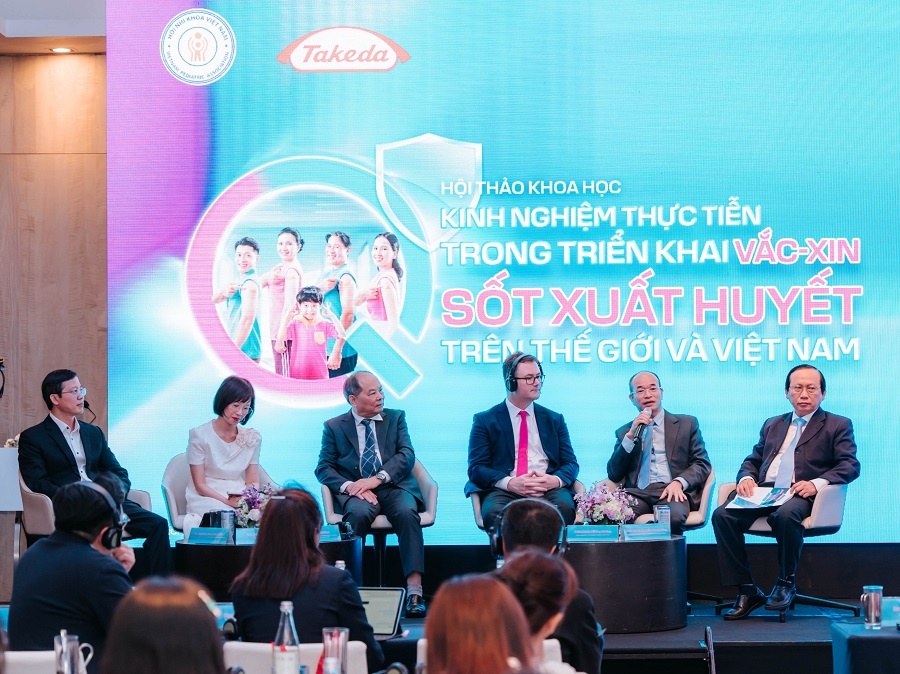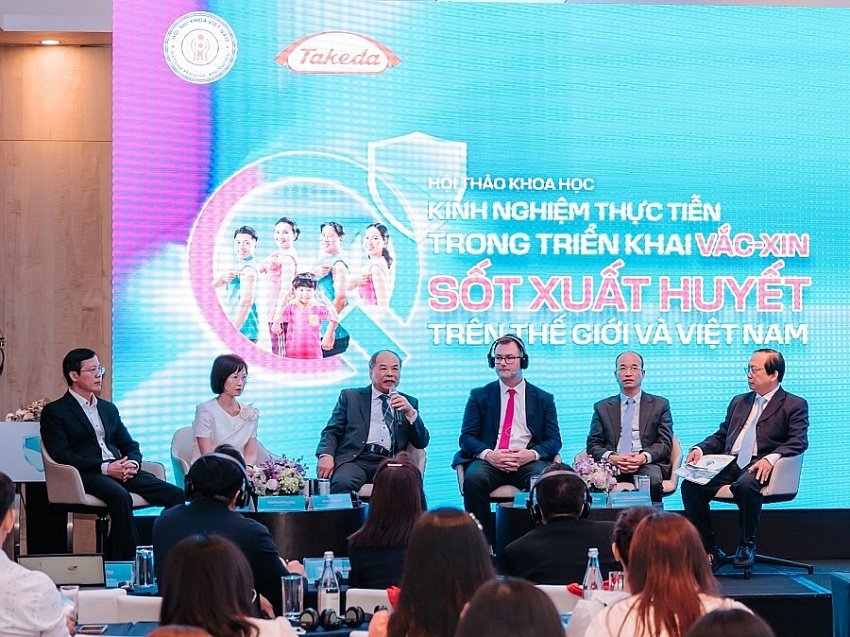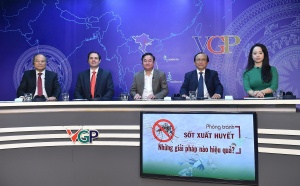Concerns mount over potential dengue fever outbreaks
The symposium, “Global and Vietnamese practical experiences in dengue vaccine implementation”, co-hosted by the Vietnam Paediatric Association and Takeda Vietnam in March, brought together leading experts in dengue fever prevention, control, and treatment, with the participation of over 500 healthcare professionals from across the country, both in person and online.
According to Assoc. Prof. Dr. Do Duy Cuong, director of the Centre for Tropical Diseases at the Hanoi-based Bach Mai Hospital, "There is no specific treatment for dengue fever, and the progression of the disease is highly complex and unpredictable. Many healthy individuals with no underlying conditions still experience rapid deterioration. In some cases, within just four to five days of fever, patients can experience shock, haemorrhage, liver damage, and severe thrombocytopenia, requiring accelerated intensive care treatment to survive the critical phase."
Beyond the risk of death, dengue fever patients may endure lasting impacts. The disease often leaves behind post-recovery complications such as hair loss, fatigue, sleep disturbances, persistent headaches, joint pain, and mild depression, symptoms that can linger for weeks, or even months, after recovery.
Experts at the symposium also emphasized that a severe case of dengue fever not only threatens the patient's life but also consumes significant human resources and treatment costs. Dr. Nguyen Huy Luan, head of the Vaccination Unit at Medicine University Hospital in Ho Chi Minh City said, "There are dengue patients who require months of treatment, with reaching costs nearly VND1 billion ($40,000) per case."
 |
| Renowned healthcare professionals at the symposia discussed the burdens of dengue fever on Vietnamese people. Photo: Takeda Vietnam |
According to Assoc. Prof. Dr. Nguyen Thanh Hung, director of Children's Hospital 1 and vice president of the Vietnam Paediatric Association, "Even a single severe dengue case can put immense pressure on a healthcare institution. At peak times, emergency departments may receive up to 30 critical cases in one night. Alarmingly, some previously healthy children attending school just a day earlier can deteriorate rapidly within 24 hours."
The Ministry of Health recommends daily check-ups and testing for dengue patients undergoing outpatient treatment. Even in the absence of warning signs, hospitalisation is advised for close monitoring, especially for high-risk groups such as the elderly, individuals with chronic illnesses, those who are overweight or obese, and people living alone, to ensure early detection and timely intervention of potential complications.
Dengue fever remains one of the few infectious diseases where, despite a solid scientific understanding of the virus, its transmission, diagnosis, and treatment, the epidemic continues to spread and grow increasingly complex, exacerbated by the impacts of climate change.
This concern was highlighted by Prof. Dr. Vu Sinh Nam, senior advisor on Dengue Fever at the National Institute of Hygiene and Epidemiology. He noted that dengue is no longer confined to the southern region. It has now spread to the Central Highlands, central provinces, the north, and even remote mountainous areas.
"What’s most concerning is the unpredictability of this epidemic," he said. "Some years see large-scale outbreaks, while others show a decline. In 2024, for instance, we saw localised flare-ups, with Haiphong reporting the highest number of cases nationwide," said Nam.
Amid the complex developments of the dengue epidemic, experts are urging a holistic approach for effective prevention. This strategy includes targeted vector control measures against Aedes mosquitoes, public education, and environmental management. Additionally, vaccination is a vital tool to lower hospitalisation rates and reduce mortality rates.
Speaking at the symposium, Dr. Le Hong Nga, deputy director of the Ho Chi Minh City Centre for Disease Control (HCDC), said, "We cannot wait for an outbreak before taking preventive measures." Nga went on to call for clear communication on integrated prevention strategies, from year-round mosquito control to proactive vaccination so that every individual becomes a vital contributor in the collective effort to prevent and control the disease.
 |
| Prof. Dr. Vu Sinh Nam, senior advisor on Dengue Fever at the NIHE (third on the left), emphasised the need for proactive prevention as dengue fever is ever-more unpredictable. Photo: Takeda Vietnam |
Dr. Derek Wallace, president of Takeda’s Global Vaccine Business Unit, said that the World Health Organisation (WHO) has recommended Takeda’s dengue vaccine for introduction in countries with high dengue burden and transmission intensity to maximise public health impact. In addition, the dengue vaccine has been prequalified by WHO, underscoring its quality and reliability as an important dengue prevention method suitable for public initiatives. The vaccine is currently approved in 40 countries, with more than 12 million doses distributed globally in both public and private drives.
According to Dr. Derek Wallace, Takeda aims to scale up production to 100 million doses annually by 2030, expanding manufacturing capacity in Germany and India to meet global demand. In addition, the company remains committed to ongoing safety monitoring and post-vaccination impact assessments.
Also at the symposium, Benjamin Ping, general manager of Takeda Vietnam, said, "Dengue prevention requires a coordinated approach. We are committed to supporting Vietnam's efforts through integrated strategies, including vaccination, stronger community awareness and close collaboration with healthcare partners to broaden dengue vaccine access and reduce the impact of dengue."
| Vietnam's Ministry of Health has raised concerns about the growing threat of dengue fever, warning that the disease could spread widely in the near future as the country heads into the rainy season – the peak period for outbreaks. Official data reveals that between December and February, dengue cases across Vietnam surged by nearly 99 per cent compared to the same period last year, with over 16,600 infections and one fatality reported. In the southern region, experts at the Ho Chi Minh City Pasteur Institute are predicting an outbreak. The HCDC reported over 6,300 cases in the city from January to April, a figure almost 2.5 times higher than the same period last year and exceeding the three-year average. |
C-ANPROM/VN/NON/0018
 | Takeda's health innovation and net-zero ambition Global biopharmaceutical group Takeda, which achieved carbon neutrality in 2020, is committed to its mission of further securing people and the planet, including the development of preventative therapies for infectious diseases - such as its dengue vaccine - which are on the rise due to climate change. |
 | Integrated solutions for dengue fever prevention in Vietnam Dengue vaccines being available in Vietnam contribute to strengthening the prevention and control strategy for this infectious disease, but synchronized implementation of multiple solutions is needed to ensure vaccine sustainability. |
 | Takeda dedicated to advanced healthcare Global biopharmaceutical company Takeda is committed to supporting Vietnam's healthcare advancement by bringing life-transforming medicine and vaccines to the population. Benjamin Ping, the new general manager of Takeda Vietnam, talked to VIR's Tung Anh about his leadership approach to foster innovation and collaboration, ensuring Takeda's positive and impactful presence in local healthcare. |
What the stars mean:
★ Poor ★ ★ Promising ★★★ Good ★★★★ Very good ★★★★★ Exceptional
Themes: Healthcare Platform
- Opella and Long Chau join forces to enhance digestive and bone health
- Hanoi intensifies airport monitoring amid Nipah disease risks
- Cosmetics rules set for overhaul under draft decree
- Policy obstacles being addressed in drug licensing and renewal
- Sanofi, Long Chau Pharmacy relaunch medicine blister pack collection initiative
Related Contents
Latest News
More News
- A golden time to shine within ASEAN (February 19, 2026 | 20:22)
- Vietnam’s pivotal year for advancing sustainability (February 19, 2026 | 08:44)
- Strengthening the core role of industry and trade (February 19, 2026 | 08:35)
- Future orientations for healthcare improvements (February 19, 2026 | 08:29)
- Infrastructure orientations suitable for a new chapter (February 19, 2026 | 08:15)
- Innovation breakthroughs that can elevate the nation (February 19, 2026 | 08:08)
- ABB Robotics hosts SOMA Value Provider Conference in Vietnam (February 19, 2026 | 08:00)
- Entire financial sector steps firmly into a new spring (February 17, 2026 | 13:40)
- Digital security fundamental for better and faster decision-making (February 13, 2026 | 10:50)
- Aircraft makers urge out-the-box thinking (February 13, 2026 | 10:39)

 Tag:
Tag:

















 Mobile Version
Mobile Version